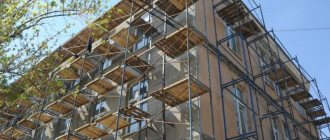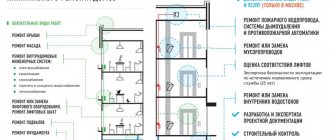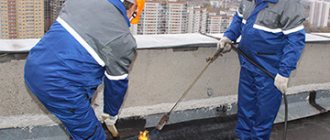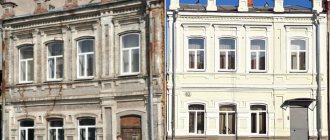Since 2014, in some regions of our country, apartment owners located in apartment buildings began to receive receipts for payment for major repairs.
This raised many questions among the population. Moreover, some of them are still relevant today. People don't understand what justification there is for such expenses. Owners of Moscow apartments also joined the residents of the regions. Increasingly, we receive questions on the portal about the relationship between the contribution rate and legislative provisions, whether it is possible to challenge payments and the debt on them through the court, etc. In this article we will try to understand what contributions for major repairs are: to pay or not and judicial practice in 2020.
If you have any questions, both on the topic of the article and on others, please contact the portal’s specialists for a free consultation.
Legal assistance is provided 24 hours a day.
Obligations of the apartment owner to provide contributions for major repairs
The current federal evidence explains that for major repairs of multi-story buildings, payments are received in two ways:
- to a specialized personal account of MKD;
- to the account of the region operator.
The choice of method is approved at a general meeting of owners of premises in the apartment building. However, such events are almost never carried out, so the second method is assigned by default.
Regional operator account
If we carefully consider it, the described option is endowed with less efficiency due to the fact that it is the operator who sets the queue for the execution of repair work. The Regional Fund is represented by a structural unit created by local authorities to solve such problems.
This year, 2021, the municipal apparatus is obliged to fulfill the following conditions:
- rationally choose a financial structure that will accumulate the money received;
- establish a period for the execution of capital restoration for each multi-storey building on the territory that is subject to their control;
- develop a plan for upcoming repair work;
- carry out preparatory activities - find a contractor.
The operator needs to take into account the number of housing constructions, and those responsible for this need to know the physical condition of each building. However, judicial practice on major repairs shows that in fact the situation has a more negative side. From this we can conclude that the restoration of the building is unlikely to be carried out as planned, and the question of finding contractors remains open.
Watch the video: “How not to pay for major repairs. Instructions."
A special bank account opened by decision of the owners of premises in the apartment building
Therefore, residents of houses should think about holding a general collection and opening a specialized account, which will receive funds for major repairs. You can create such an account within 60 days after starting participation in the program. Ignoring the condition will lead to automatic transfer of money to the regional operator.
When using the first option, funds will be transferred to the personal account of the MKD, however, several aspects must be taken into account.
The general meeting of apartment owners should highlight the following factors:
- The amount of transfers cannot be less than the tariff determined by the state. However, at the request of the owners, its size can be increased.
- Develop a plan listing repair services provided from proceeds.
- Indicate the period for carrying out the necessary capital works.
- Select a banking structure for opening a bank account and accumulating funds.
- Appoint a manager, since the apartment building is not a legal entity.
- Find a contractor to carry out the repairs, with a preliminary estimate.
The quality of the service provided will be assessed by the council of residents of the building.
Dispute regarding the provision of documents related to the opening and maintenance of a special account
The second dispute also occurred between the regional operator and the homeowners' association. It is about the obligation to provide documents and information related to the opening and maintenance of a special account. Based on the materials of Resolution 16 of the AAS dated March 23, 2020 in case No. A22-1762/2019.
At a meeting of owners of apartment building premises, a method for forming a capital repair fund in a special account was determined. The owner of the special account was the HOA.
Three years later, the city administration adopted a resolution regarding this house on the formation of a capital repair fund on the account of the regional operator. Considering that there were funds remaining in the HOA’s special account, the operator went to court with demands to transfer the balance to him, as well as to provide documents and information related to the maintenance of this account.
The court found no grounds to satisfy the regional operator's claims. In the decision, the department referred to the current housing legislation, as well as to the resolution of the Constitutional Court of the Russian Federation dated April 12, 2016 No. 10-P, according to which the choice of the method of forming a capital repair fund for common property in an apartment building is the result of the free will of the owners.
The appellate court agreed with the findings of the lower court, leaving the regional operator's complaint unsatisfied.
State Housing Code, other legal acts
The Housing Code in Article 169 indicates the following:
- Payments for major repairs are mandatory.
- The amount of the fee is determined by each region separately. For example, a unit of Br/m2 for St. Petersburg was 2.50 rubles, while in the Tyumen region it was 20.
- The number of contributions must be calculated using a formula where the entire area of the building is multiplied by the tariff adopted by the state or apartment owners.
- If the house has non-residential premises, their owners also pay for such a service.
- The monthly funds paid are intended only for capital works of the common property located in this building.
The regulatory provision also states that the money transferred under the capital repairs item can be sent to the account of a regional operator or front house.
Other ways to save legally
However, it is quite possible to reduce the current costs of payments to the Federal Credit Fund. If the residents of the house are part of a HOA or join an initiative group, they can:
- conclude an agreement to place advertising banners on the facades of the house, rent out part of the common areas of the house to third-party organizations - the funds received can be used to pay contributions to the FKR, provided that they are accumulated in a special account;
- organize the necessary repairs on your own - with the involvement of a contractor. In this case, an amount equivalent to that spent will not have to be contributed to the FCR, provided that the work performed is included in the long-term plan. In this case, it is necessary to coordinate the repair with the regional operator;
- if there is half the minimum amount in the account according to the local standard approved by the authorities, payments for major repairs can be suspended.
Individuals renting out apartments under a rental agreement can reduce their costs for contributions to the FKR by agreeing on their payment with the tenant. However, you need to understand that such a clause cannot officially appear in the terms of the transaction, since the owner of the property is obliged to pay the fees.
Making payments for major repairs
Two ways to form a capital repair fund.
Before the housing and communal services reforms came into force, the population regularly paid for services, despite their constant rise in price. However, innovations also raised the price by almost a quarter, which simultaneously occurred with an increasing unemployment rate.
Quiet statements about contributions for capital restoration work grew into loud statements of protest, which resulted in the pages of the domestic media. However, this does not mean that monthly transfers to the fund or personal account are canceled.
The legislation provides a clear answer to the worried population. Owners of apartments located in multi-storey buildings are required to pay money to pay for utilities, especially since major home repairs are an integral part of the services. This is indicated in the Housing Code of the Russian Federation, in particular Art. 153 and 154.
The legal provision is mandatory, so defaulters are subject to civil liability. For example, a penalty is charged, and judicial practice on contributions for major repairs refers to Art. 155 of this Law.
If the amount of the obligation exceeds 10 thousand rubles, the debtor is prohibited from leaving the country - Art. 67 Federal Law No. 229 (new edition 2020).
When collecting a debt for major repairs, judicial practice refers to the Civil Procedure Code (CPC), Art. 122 and 131. However, even state legal acts cause a lot of controversy in legal circles. For example, that in the case of fundraising, it is necessary to rely on the Civil Code of Russia - Art. 702, which indicates that the execution of a contract before carrying out major repairs appears to be a voluntary action.
Therefore, monthly contributions cannot be required. But if this is a public agreement, then by paying once, the apartment owner gives his consent to the transfer of funds. After securing the first payment, he is obliged to carry out this operation monthly.
For improper implementation of legislation on the transfer of payments, the following forms of liability are provided:
- The debtor is sent a court order for major repairs to reimburse the debt at the request of the claimant - Civil Procedure Code, Article 128.
- The debt under the obligation is collected on the basis of a decision of the highest authorities upon completion of the writ proceedings - Art. 130 of the mentioned Law.
- Calculation of penalties, based on the length of the period of non-payment, for each overdue day - Housing Code of the Russian Federation, clause 14.1 of Article 155.
- Penalties are imposed by a court decision with compensation of the principal amount in case of evasion of the obligation.
- The debtor's property is confiscated for the total amount of the debt, which is sold at auction and used as repayment - Law No. 229, Article 69 (current version 2021).
- The seizure of the debtor's personal property is carried out in favor of the capital repair fund until the entire arrears are paid - Federal Law No. 229, Art. 80.
- Bailiffs seize personal accounts, which is expressed by temporarily freezing their use or repaying the accrued debt - Federal Law No. 229, paragraphs. 7 paragraph 1 art. 64.
- The restriction on departure is regulated by this Law, which prohibits leaving the state if the amount of the unpaid obligation exceeds 30,000 rubles - paragraphs. 15 paragraph 1 art. 64.
Enforcement proceedings with the participation of bailiffs are opened upon an appeal from a housing office or a court decision at the request of a claimant - Article 30 of Federal Law No. 229.
If the debtor has an apartment as his only place to live, he cannot be forcibly evicted from it. If sold by the owner himself, the indicated debt for major repairs is added to the sales amount, which will inflate the price of the apartment and negatively affect the buyer’s opinion.
Violation 2: absence of a decision by the GSM or lack of a quorum of votes at the meeting
The second violation that special account owners often commit is carrying out major repairs of common property in an apartment building in the absence of a decision by the general meeting of apartment owners, or in the absence of a quorum.
Making decisions on major repairs of apartment buildings and on the use of the capital repair fund is within the competence of the general meeting of owners (Part 2 of Article 44 of the Housing Code of the Russian Federation). Without OSS, the owner of a special account cannot spend the funds accumulated in the special account.
A quorum of at least 2/3 of the total number of votes of the owners in the house is needed to establish the amount of the contribution for major repairs, more than the minimum, to decide to take out a loan or a loan (clauses 1.1–1, 1.2, part 2, article 44 of the Housing Code of the Russian Federation , part 1 of article 46 of the Housing Code of the Russian Federation).
Decisions on how the capital repair fund will be formed, who will open a special account, must be voted “for” by OSS participants who have a majority of votes from the total number of votes in the house (Clause 1.1, Part 2, Article 44, Part 1, Article 46 of the Housing Code RF). By a simple majority of 50% + 1 vote of the number of votes of meeting participants, decisions are made on the following issues:
- approve the list of works and services, terms, estimates, contractor;
- determine the procedure for providing payment documents for payment of contributions for major repairs;
- select a credit organization to open a special account, approve the text of the agreement with such organization.
How to prevent violations: strictly follow the procedure for organizing major repairs and conducting OSS, and carefully approach quorum calculations. We recommend holding the meeting in person or in absentia in order to accurately obtain a quorum if few owners will be present at the physical part.
What should the management company do to collect a quorum at the general meeting of owners?
Arbitrage practice
What is included in the list of works for the overhaul of an apartment building.
Based on judicial practice in collecting debts for major repairs, institutions collect debts from apartment owners without hindrance. Many collection cases were carried out using a simplified procedure. This means that the meeting does not issue a decision, but an order that is binding.
Reimbursement through the overhaul authority is reflected in an increase in debt, over one and a half thousand rubles.
Court rulings on illegal payments for major repairs
The Novomoskovsk City Court of the Tula Region declared the accrual of contributions for major repairs illegal - case number 2819/2017. – and canceled the penalties imposed by the Fund.
The Khanty-Mansiysk District Court found the imposition of payments for major repairs unauthorized. He annulled the penalty and ordered compensation for moral damages to the owner of the apartment. Case number 21234/2017.
Compensation for repairs not made
By decision of the Sovetsky District Court in favor of the defendant, compensation was recovered for the failure to carry out major repairs of the house, the wear and tear of which was more than 60%. Case number 2405/2016.
A similar decision was made by the Leninsky district authority of the city of Perm (21167/2017).
Debt collection
Judicial practice in collecting debt for major repairs shows that the Arbitration Body of the Vladimir Region decided to collect the debt to restore the building from the defendant.
Case number A11-1412/2018.
Collection of penalties
The Yuzhno-Sakhalinsk City Court decided to collect from the defendant, in addition to the debt for major repairs, the accrued penalty. Case number 22754/2018.
Practice of the Russian Armed Forces
The determination of the Russian Armed Forces, case number 57APG143, dated June 4, 2014, states that home owners participate in the costs of maintaining common household property.
Resolution of the Court in proceedings No. 13APG1423 dated July 23, 2014 indicates that local government bodies organize major repairs of multi-storey buildings at the expense of payments from apartment owners.
Constitutional Court and renovation of the apartment building
In this case, experts recommend that you familiarize yourself with the Resolutions of the Constitutional Court of Russia No. 10P of 04/12/16 and No. 12P of 02/25/19.
The Constitutional Court clarified who bears the burden of responsibility for major repairs of houses where some of the apartments have been privatized
On March 12, the Constitutional Court of the Russian Federation issued Ruling No. 557-O/2019 on a request to verify the constitutionality of the provision of Part 1 of Art. 190.1 “Features of organizing capital repairs of apartment buildings that required major repairs on the date of privatization of the first residential premises” of the Housing Code of the Russian Federation, with which a group of State Duma deputies addressed the Constitutional Court. In their opinion, the contested norm contradicts the Constitution of the Russian Federation, allowing for a reduction in the volume of public legal obligations in relation to citizens who privatized apartments in buildings that required major repairs at the time of privatization.
Position of the applicants
Thus, the condition that the former landlord (an authorized body of state power or local self-government) carries out major repairs in a house included in the long-term and (or) annual plan only on the date of privatization of the first residential premises in it, excludes the obligation of the state to carry out such repairs, if it was required at the time of privatization of the second and subsequent apartments. According to the applicants, this not only reduces the scope of public law obligations established by Art. 16 of the Law on the Privatization of Housing Stock, but also creates inequality between owners who privatized their apartments before and after the privatization of the first residential premises in such a building.
The deputies also noted that before amendments were made to Art. 16 of the Law, the obligation of former landlords to carry out major repairs did not depend on the date of privatization of the first apartment in the house. At the same time, from the literal interpretation of the norm, it followed that the corresponding public legal obligations arose not in relation to the house, but in relation to each citizen who has the right to use housing on the terms of social rent, despite the fact that at the time of privatization of such residential premises the house required major repairs.
Meanwhile, the mechanism provided for by law, which consists in the fact that after the approval of the regional capital repair program, all owners of the houses included in it bear the cost of paying the corresponding contributions, implies the release of public legal entities from the obligations to carry out major repairs to persons who have privatized apartments in houses in need of it, but did not require it at the time of privatization of the first apartment.
The Constitutional Court did not find any uncertainty in the contested norm
Refusing to accept the complaint for consideration, the Constitutional Court indicated that, when establishing the procedure for the privatization of state and municipal housing stock, the legislator took into account its actual technical condition.
In the original version of Art. 16 of the Law on Privatization, he provided that the privatization of apartments in buildings requiring major repairs is carried out, as a rule, after the latter has been carried out by the landlord, and with the consent of citizens, compensation can be paid for repairs not made. The responsibility for subsequent major repairs is borne by homeowners, including citizens (Resolution of the Constitutional Court dated April 12, 2021 No. 10-P, Definitions dated October 19, 2010 No. 1334-O-O, July 14, 2011 No. 886-O -O and dated March 1, 2012 No. 389-O-O).
Thus, the definition emphasizes that the retention by former landlords of the obligation to carry out major repairs of houses that needed it is a statutory exception to the general rule that the owner bears the burden of maintaining the property he owns.
The Constitutional Court noted that, in accordance with the contested norm, imposing the obligation to carry out major repairs on a state authority or local government is possible only if, before the date of privatization of the first apartment, the house was included in the long-term and (or) annual plan, but major repairs were not carried out , and also provided that the overhaul of common property after the date of privatization of the first apartment until the date of inclusion of the house in the regional overhaul program was not carried out at the expense of budgetary funds.
Thus, from the moment of privatization of the first apartment in such a house, the corresponding public legal entity ceases to solely bear the burden of its maintenance - subsequent expenses are assigned to it in proportion to the share in the right of common ownership of the common property.
At the same time, the Court emphasized that the privatization process, which began in the 90s. The twentieth century is not limited to a certain period and continues at the present time; the natural wear and tear of apartment buildings does not stop or stop, and the need to carry out major repairs arises repeatedly. Based on this, the retention of the obligation for the former landlord to carry out major repairs of houses that were previously part of the state or municipal housing stock should not be interpreted as imposing on him the obligation for major repairs, the need for which will arise until the completion of the privatization of all premises in the house. At the same time, owners of privatized apartments in such buildings are not exempt from the costs of maintaining common property, including contributions for major repairs.
Otherwise, as stated in the document, it would lead to an unlawful redistribution of the burden of maintaining common property, would violate the balance of public and private interests, as well as the constitutional principles of equality, fairness and proportionality. In addition, this could lead to unjust enrichment of the owners of premises, during the privatization of which there was no need for major repairs.
Distinguishing the responsibility of the former landlord to carry out major repairs of houses in need and the burden of maintaining common property placed on the owners of premises also makes it possible to determine the volume of corresponding budget funds. At the same time, the Constitutional Court emphasized, the public obligation of the former landlord to carry out major repairs cannot be considered as arising again in relation to each new owner of a house in need of major repairs at the time of privatization of the corresponding apartment.
Experts assessed the Court’s position differently
Lawyer of the Moscow Region Administrative Office Tatyana Seregina supported the position of the Constitutional Court. “The definition can be called socially oriented,” she explained to AG. “The court rightly drew attention to the inadmissibility of unjust enrichment of the owner of each subsequent premises, during the privatization of which the house did not need major repairs.”
As the expert noted, the Constitutional Court explained that the introduction of the contested norm of the Housing Code was dictated by judicial practice and executed by the latter in order to streamline the implementation of major repairs precisely in those cases where it was not initially carried out (during the period of privatization), or not in full - of course , taking into account the conditions necessary for its implementation.
The lawyer added that the definition contains a fundamentally new approach to identifying the concept of a house’s need for major repairs. In addition, the Court for the first time ordered the overhaul of apartment buildings in which it was previously required. “The definition is now the main source explaining the provisions of Art. 190.1 ZhK,” she emphasized.
According to Tatyana Seregina, although the contested norm is aimed at prospective regulation of relations for carrying out major repairs in an apartment building, it is based on a retrospective approach, since all the main points are indicated in the past. “The successful combination of the two approaches makes it possible to comprehensively regulate public relations in this area,” she believes.
Lawyer of AK No. 22 “Civil Compensation” of the Nizhny Novgorod Regional Bar Association Alexander Nemov considers the legal position of the Constitutional Court to be contradictory. He explained that the Constitutional Court, on the one hand, rightly indicated that responsibility for the maintenance of an apartment building, including carrying out major repairs, before the first fact of privatization of the premises should be borne by the previous landlord: “This position is logical, since it is very unfair to shift the responsibility onto the shoulders of new owners are the result of long-term inaction of the previous owner, who did not properly maintain the common property of the house.”
On the other hand, the lawyer noted, the position that the new owner is still obliged to pay contributions for major repairs, including due to the fact that “the natural wear and tear of apartment buildings does not stop or stop,” seems unconvincing. “The reference to the norms on the mandatory payment of taxes and fees is doubtful,” believes Alexander Nemov, “since the Constitutional Court itself indicated that the contribution for major repairs is not an analogue of mandatory payments and taxes. The court did not explain what the funds collected by the owners will be used for after the repairs have been carried out by the previous landlord as part of the current program.”
According to the lawyer, it would be more logical to temporarily exempt the new owners from paying contributions - at least until the previous owner carries out major repairs - and the Constitutional Court protected the public interest in this matter. “The definition closes the dispute about contributions for major repairs when work is carried out ahead of schedule at the expense of the budget, which simplifies life for regional operators,” summed up Alexander Nemov.
Partner, head of practice of the Legal Group, Alexander Latyev, noted that the Constitutional Court, having formally avoided resolving the issue of the constitutionality of the disputed provisions, nevertheless responded to the request of the deputies, unequivocally indicating that it considers the controversial norm to comply with the Constitution. “Article 190.1 appeared in the Housing Code only in 2017 and determines that in relation to houses, the decision to include them in the capital repair plan was made before the privatization of the first premises, the obligation of the previous owner-tenant to carry out major repairs remains, and if such a need has already arisen after the privatization of at least one premises, repairs must be carried out at the expense of the owners themselves,” he explained.
According to the expert, the Constitutional Court rightly pointed out that the privatization of housing in Russia continues to this day: “So, linking the moment at which the previous owner’s obligation to carry out major repairs ceases with the privatization of the last room in the house, as the applicants apparently proposed, is to actually perpetuate this duty.”
On the other hand, noted Alexander Latyev, one cannot help but recognize the extreme arbitrariness of the moment established by the contested norm: the privatization of the first premises does not depend on the will of other owners of premises in the same building, of which there may be incomparably more than those who privatized their premises. “The privatization of housing in Russia was a clear example of the unfair and largely random distribution of state (mostly) property between citizens,” he explained. – Those who received good housing while it was being built for public money were able to privatize it for free. Those who, for various reasons, did not have time to do this were forced to make do with what was left - rooms in communal apartments, dormitories, rooms in emergency buildings. We can discuss for a long time the reasons why some were lucky and others were not, but the task of housing privatization was to create a class of owners here and now, for the solution of which, probably, there was no better tool than such - albeit unfair - privatization.” .
The contested norm, the expert believes, supports this injustice: “If someone is unlucky enough to live in a house that required major repairs, but in which one of the neighbors was in a hurry to privatize the apartment, then he should no longer hope for repairs at the expense of the state. Moreover, the house may have been built a long time ago, and the lion's share of its wear and tear occurred at a time when private ownership of apartments did not exist. Accounting for the period of wear and tear accumulation is ignored by the specified article of the Housing Code.”
According to Alexander Latyev, the situation could have been resolved much more subtly and fairer, but for this it was necessary to completely change the attitude towards such repairs: instead of understanding it as a public legal obligation of the previous employer, it was worth remembering that earlier the Constitutional Court in Resolution No. 10-P indicated, that contributions for major repairs are a manifestation of the private legal burden of the owner, provided for in Art. 210 GK.
“If so, it would be worth recognizing that since in some premises that have not yet been privatized, the obligation to make contributions for repairs is still assigned to the public owner, then the same approaches should be applied to previously privatized premises: public previous owner must bear the costs of major repairs based on how long the premises in a particular house remained in his ownership,” the expert indicated.
Such a solution, Alexander Latyev believes, would be incomparably more complicated and would require an individual approach to each case. “However, it is no secret that universal abstract solutions, as in Art. 190.1 Housing codes, as a rule, are simple, but at the same time rude and often unfair, he concluded. “Which should we give priority to – simplicity or justice?” the Court was asked to answer. He avoided answering, but made it clear that simplicity is closer to him here.”
Refusal of payments
Apartment owners have the right to demand at any time a report on the work done, find out how money is spent, and how much is left in the account.
The most important aspects of carrying out a major renovation of a house are the following:
- repair work can be carried out at any time of the current year, this also includes emergency cases;
- the fund must have an action plan drawn up for the future period;
- the formation of cost estimates is based on the reality of providing services at the current moment;
- the remaining funds are used for future repairs.
Watch the video: “What surprises does the regional overhaul program hide?”
If residents of rural areas have doubts about the improper use of money, they can resort to the help of regulatory organizations.
These are the following authorities:
- Regional branch of Rospotrebnadzor, which protects the rights of consumers - customers of major repairs.
- Local government authorities to create a commission to investigate the incident.
- The prosecutor's office, if there is a suspicion of fraudulent transactions with money and bringing violators to court.
- Regional Department of Housing and Communal Services.
The latter can provide qualified advice and answer questions regarding the capital restoration of buildings.
Frequently asked questions from owners
- Will major repairs be carried out if the previously transferred funds to the FKR account are not enough? Yes, the work included in the plan will be completed even if there is insufficient funding from the owners. For their implementation, funds accumulated by the Federal Credit Fund in a consolidated account and bank credit lines are attracted. This will not change the amount of residents' contributions; repairs will be carried out on credit.
- Will the amounts spent by residents on general building repairs be counted if they were not included in the regional program? Partial or full offset of such expenses is possible only if they are included in the plan of the regional operator, or if there is a proven need for them to be carried out with adjustments to the program.
- Do I need to pay for major repairs, and what consequences may arise if contributions are not transferred to the Fund? If a debt arises for a period of more than 6 months, the regional operator has the right to recover funds from the debtor through the court. The consequences will depend on the size of the delay, the primacy of the violation and other factors.
- Since payments for major repairs are equated by law to payments for utility services, the conditions for claiming them are similar. The court can not only issue a ruling on debt compensation and penalties, but also seize the debtor’s property or temporarily restrict his travel outside the Russian Federation.
- The HOA did not enter into a separate agreement with the regional operator. Does this mean that there is no need to pay contributions to the FKR? No, that doesn't mean it. All homeowners of apartment buildings are required to pay contributions for major repairs.
Text: Svetlana Kuryleva
Exemption from payments for renovation of apartment buildings
The state Housing Code completely exempts the following categories of citizens from contributions for capital renovation of buildings:
- owners of buildings whose condition is classified as emergency;
- residents of apartments classified as municipal property;
- veterans of the Great Patriotic War;
- persons holding the title of Honorary Citizen of Russia;
- elderly people whose age is over 80 years.
Owners of new buildings during the warranty period are exempt from making mandatory contributions.
Benefits are also provided, according to the Housing Code, Art. 159, if the amount for utilities exceeds the maximum family expenditure.
From January 1, 2021, local state administrations have the right to fully or partially exempt certain categories of residents from such a tax:
Table 1.
| Name of citizen groups | Benefit amount, % |
| Single persons of retirement age over 80 years of age | 100 |
| People over 70 years of age | 50 |
| With disabilities of 1st and 2nd groups | 50 |
| Children with disabilities | 50 |
| Parents raising a child with a disability | 50 |
The implementation of this form of preferences is left to the discretion of local government bodies, but is not one of their responsibilities. Discounts do not automatically apply to the listed categories of citizens.
To receive the benefit, you must contact the regional capital repair operator in writing to confirm your position with the relevant documents.
Procedure
If the property of the owners in your apartment building was damaged due to major repairs, advise them on the following course of action.
- Drawing up an inspection report. Specialists from your management organization will need to participate in the inspection.
- Damage assessment. Damage assessment is paid and done by a specialist. The assessment is carried out at the expense of the owner.
- Claim. You can try to offer the regional operator to voluntarily compensate for the damage in a pre-trial manner.
- Dispute settlement before trial. Refer to the evidence from this case. Perhaps this will work.
- Court. If the case is similar, don't be afraid to go all the way to the Supreme Court.
Circumstances for recognizing an unlawful recovery of payments for building repairs
Judicial practice regarding the capital repair fund shows that some citizens, among bona fide tax payers, are faced with the fact of non-payment. Such incidents occur as a result of errors by a regional home restoration operator or the owner of a specialized personal account. Most often this happens due to incorrect accounting of square meters of housing or another error in the calculation. Therefore, imaginary debtors have to defend their interests in court.
If such a misunderstanding occurs, the apartment owner must contact in writing the entity that sent the incorrect receipt. The application is supplemented with copies of payment documents, which confirms the deposit of funds.
If a negative response is received or the request is ignored, the citizen has the right to contact the State Housing Commission, which will review the correctness of the calculation. If it is not possible to achieve satisfaction here, the owner has every reason to file a claim in court.
Our recommendations for all special account holders
We have analyzed the list of the most frequent violations that were committed by management entities, homeowners' associations and cooperatives as owners of special accounts, using the example of the practice of the GZhN body from Udmurtia. This list may be expanded or shortened depending on the region. General recommendation for all managers of buildings where the owners of the premises accumulate a fund in a special account:
- Carefully study the federal and regional requirements for maintaining a special account.
- Assign a responsible person to ensure compliance with these requirements, deadlines and necessary procedures.
- If the State Housing Inspectorate during an inspection recorded a violation that you did not commit, defend your rights with the help of claims and a lawsuit in court.
Next week we will review the violations committed by redevelopment operators and give advice on how management and homeowners associations can work with them for the benefit of the owners of premises in the house.
If in your practice there have been instructions from the State Housing Authority regarding the maintenance of special accounts, positive court decisions to challenge them, send them to us at We will select cases that are useful for house managers and review them.
You can also send us ready-made material for publication and become our author: to do this you need to take four simple steps.









